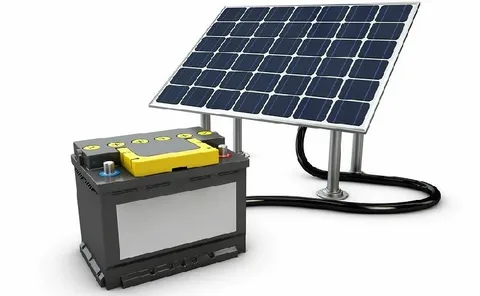Solar energy is becoming an increasingly popular and sustainable way to power homes and businesses. As the demand for renewable energy grows, solar panels have become a household staple. However, there is another important component of a solar energy system that often goes unnoticed: solar batteries. Solar batteries store the excess energy generated by solar panels and provide power when the sun isn’t shining. These batteries offer a range of benefits, making them a valuable investment for homeowners and businesses alike.
What Are Solar Batteries?
Solar batteries are devices that store excess energy produced by solar panels. Instead of letting unused electricity go to waste, the batteries store it for later use. The stored energy can be used when the sun is not shining, during cloudy days, or at night. Solar batteries help ensure that you can make the most of the energy generated by your solar panels.
1. Maximizing Solar Energy Efficiency
One of the key benefits of using solar batteries is the ability to maximize the efficiency of your solar energy system. Without a battery, excess energy produced during the day is often sent back to the grid, which may not always be the most cost-effective option. By storing the energy in a solar battery, you can use it during the evening or on cloudy days, reducing reliance on grid power.
Solar batteries make it possible to use your energy as you generate it, ensuring you get the most value from your solar panel investment. This maximization of energy efficiency is a major reason why many homeowners and businesses choose to add batteries to their systems.
2. Lower Electricity Bills
By using solar batteries to store excess energy, you can significantly reduce your electricity bills. Many utility companies charge more for electricity during peak hours, which are usually in the evening when demand is highest. With a solar battery, you can use the stored energy during these high-cost periods, instead of drawing power from the grid. This shift reduces your dependency on utility companies and helps lower your monthly electricity expenses.
Additionally, some regions offer net metering programs, where you can sell excess energy back to the grid. By storing excess energy in a battery, you may be able to avoid giving away your power and instead use it for your own needs, saving more money in the long run.
3. Energy Independence
One of the most compelling reasons to install a solar battery is the ability to achieve energy independence. Relying on the grid for electricity means that you are subject to fluctuations in energy prices and potential outages. By integrating solar batteries into your system, you can reduce or eliminate your dependence on the utility grid.
Energy independence means you have greater control over your energy consumption and costs. You can rely on the energy stored in your solar batteries, giving you more flexibility and security. In areas with unreliable grids or frequent power outages, solar batteries provide a valuable backup energy source to keep your home or business running smoothly.
4. Backup Power During Outages
One of the greatest advantages of solar batteries is their ability to provide backup power during grid outages. In the event of a power cut, your solar battery can kick in and supply energy to your home or business. This is particularly beneficial in areas that experience frequent power outages or where grid reliability is a concern.
Without solar batteries, you would lose power during an outage if the solar panels are not actively generating energy. With solar batteries, however, you can continue to use energy stored in the system. This gives you peace of mind knowing that your essential appliances and devices will continue to operate, even during a blackout.
5. Environmental Impact
Using solar batteries helps to reduce your carbon footprint and minimize environmental impact. Solar energy is a clean, renewable resource that does not produce harmful greenhouse gas emissions. By storing excess solar energy for later use, you can reduce your reliance on fossil fuels and decrease the amount of electricity generated from nonrenewable sources.
When combined with solar panels, batteries further support the transition to a greener and more sustainable energy system. As more people adopt solar energy solutions, the collective impact on the environment will continue to be positive.
6. Increased Property Value
Installing solar panels and solar batteries can increase the value of your property. Homebuyers are increasingly looking for energy-efficient and environmentally friendly homes, and solar installations are an attractive feature. Adding batteries to your system enhances the appeal of your home even further, making it a more valuable asset on the market.
Properties with solar energy systems are often viewed as more modern, eco-conscious, and cost-efficient. This can give sellers a competitive edge in the housing market and can lead to quicker sales and higher prices.
7. Grid Stability
Batteries can contribute to the overall stability of the grid. By storing excess energy generated by solar panels and reducing demand on the grid, solar batteries help balance supply and demand for electricity. This can be especially beneficial during times of high demand or during grid strain.
In areas with a large number of solar installations, solar batteries can work together to reduce the need for additional power plants or infrastructure upgrades. As more people adopt solar energy and battery systems, the collective impact on grid stability can be significant.
8. Technological Advancements
Solar battery technology has come a long way in recent years. Modern batteries are more efficient, longer-lasting, and affordable than ever before. With advances in lithium-ion technology and other innovations, solar batteries are now more accessible to homeowners and businesses.
Battery manufacturers are also working to improve the lifespan and performance of these systems, making them an even more attractive investment. With warranties often lasting 10 years or more, solar batteries offer a reliable and long-term solution for energy storage.
Conclusion
These energy storage systems offer a wide range of benefits, from maximizing energy efficiency to reducing electricity bills and providing backup power during outages. With technological advancements and a growing focus on renewable energy, these systems are becoming more accessible and cost-effective for homeowners and businesses. By adding this type of energy storage to your system, you can enjoy greater energy independence, contribute to a cleaner environment, and increase the value of your property. As the demand for solar energy continues to rise, the role of these systems will only become more important in creating a sustainable energy future.
FAQs
1. How long do solar batteries last?
Most solar batteries have a lifespan of 10 to 15 years, depending on the type of battery and how well it is maintained. Lithium-ion batteries, which are commonly used in solar systems, tend to last longer and perform better than older lead-acid batteries.
2. Are solar batteries worth the investment?
Yes, solar batteries can be a worthwhile investment for homeowners and businesses looking to maximize the efficiency of their solar energy systems. They help reduce electricity bills, provide backup power during outages, and contribute to energy independence. However, the initial cost of installation can be significant, so it’s important to consider your long-term energy needs and goals.
3. Can solar batteries be used with existing solar panels?
Yes, solar batteries can be added to existing solar panel systems. However, it is important to ensure that the system is compatible with the battery you choose. A professional solar installer can assess your current system and recommend the best battery options for your needs.
4. How much do solar batteries cost?
The cost of solar batteries can vary widely depending on the size and brand. On average, residential batteries can cost between $5,000 and $10,000, including installation. The price may be higher or lower depending on your location and energy needs.
5. Do solar batteries work during power outages?
Yes, batteries can provide power during grid outages. However, in most cases, your solar panels must also be equipped with an inverter that allows for off-grid use. Not all solar systems are designed to operate during an outage, so it’s important to confirm that your system is set up for backup power.

